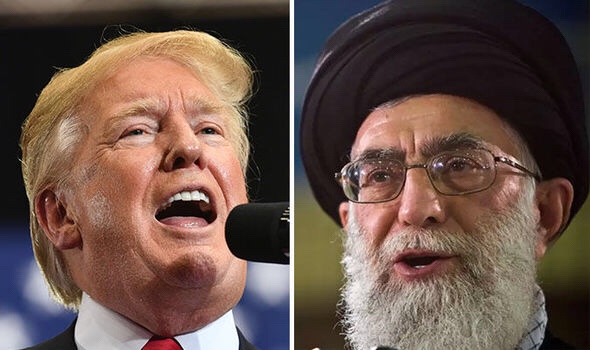
World War 3 WARNING: Iran WILL increase uranium enrichment as NUCLEAR threat RISES
Latifa Yedroudj
| UPDATED: 19:57, Tue, Jun 5, 2018
IRAN's supreme leader Ali Khamenei has declared to openly re-start its nuclear programme - enriching uranium which could potentially produce weapons grade fissile material.
Trump demands changes to 'disastrous' Iran nuclear deal
The Iranian government has lashed out at the 2015 Iran nuclear agreement, threatening to develop its nuclear arsenal if the deal falls apart, with tensions escalating across member states.
The government in Tehran told the UN nuclear watchdog its plans to produce feedstock for centrifuges - the machines used to enrich uranium.
A spokesman for the International Atomic Energy Agency (IAEA) confirmed Tehran's move, saying: "The Agency received a letter from Iran on 4 June informing the Agency that there is a tentative schedule to start production of UF6."
Uranium hexafluoride, also known as UF6, is the feedstock for centrifuges and a key ingredient in the uranium enrichment process.
Iran made the announcement in Vienna on Tuesday, following the country's outrage at newly imposed US economic sanctions.
On Monday, Iranian Supreme Leader Ali Khamenei threatened to increase the country's uranium enrichment capacity if the nuclear deal fell apart, following US withdrawal from the agreement last month.
However, European members are trying to salvage the 2015 Iran nuclear deal as Tehran is set to increase its uranium enrichment capacity.
The 2015 Iran agreed to a long-term nuclear deal with the US, UK, France, China, Russia and Germany, imposing restrictions on their nuclear activity in exchange for lifting crippling economic sanctions.
France, Britain and Germany are attempting to rescue the agreement, which has been left in turmoil since the US re-imposed sanctions on Tehran, claiming that Iran posed a serious security threat.
Iran has declared to increase its uranium enrichment capacity, which is used to make nuclear weapons
The head of Iran's Atomic Energy Organisation, Ali Akbar Salehi said: "If we were progressing normally, it would have taken six or seven years, but this will now be ready in the coming weeks and months."
According to Mr Salehi, Iran has been developing its nuclear infrastructure for building advanced centrifuges at its Natanz facility, Iran's largest uranium enrichment site.
Mr Salehi said the announcement came as instructions from Mr Khamenei, who strictly ordered officials to be prepared to increase enrichment if the Iran nuclear agreement, also known as JCPOA, breaks down.
Mr Salehi added: "If the JCPOA collapses - please pay attention, if the JCPOA collapses - and if we decide to assemble new centrifuges, we will assemble new-generation of centrifuges.
"However, for the time being, we move within the framework of the JCPO."
The deal currently only allows Iran to enrich uranium to 3.7 percent - far below 90% threshold of weapons-grade material - limiting its stock of enriched uranium hexafluoride at 300kg.
Mr Khamenei had previously warned European countries that they would increase uranium enrichment capacity, citing his disapproval of imposed sanctions.
He said: “Some European countries appear to expect the Iranian people to both tolerate and deal with the sanctions, to go along with them, and give up [the country’s] nuclear energy activities while continuing to observe the restrictions set by the deal.
“I am telling these countries that they need to be conscious of the fact that this is a dream that will never come true. The people of Iran and the government of Iran will never tolerate both suffering from sanctions and nuclear restrictions. This will never happen.”
No comments:
Post a Comment